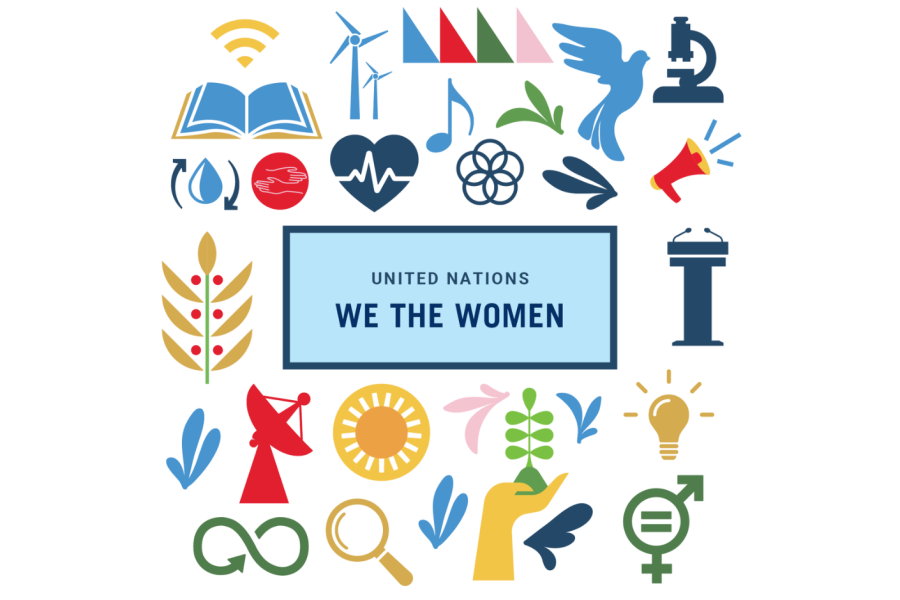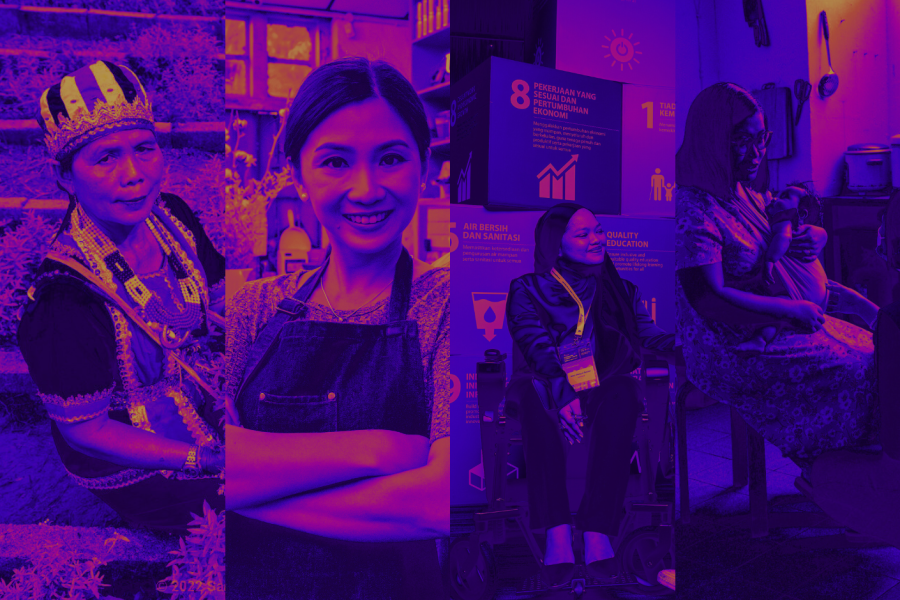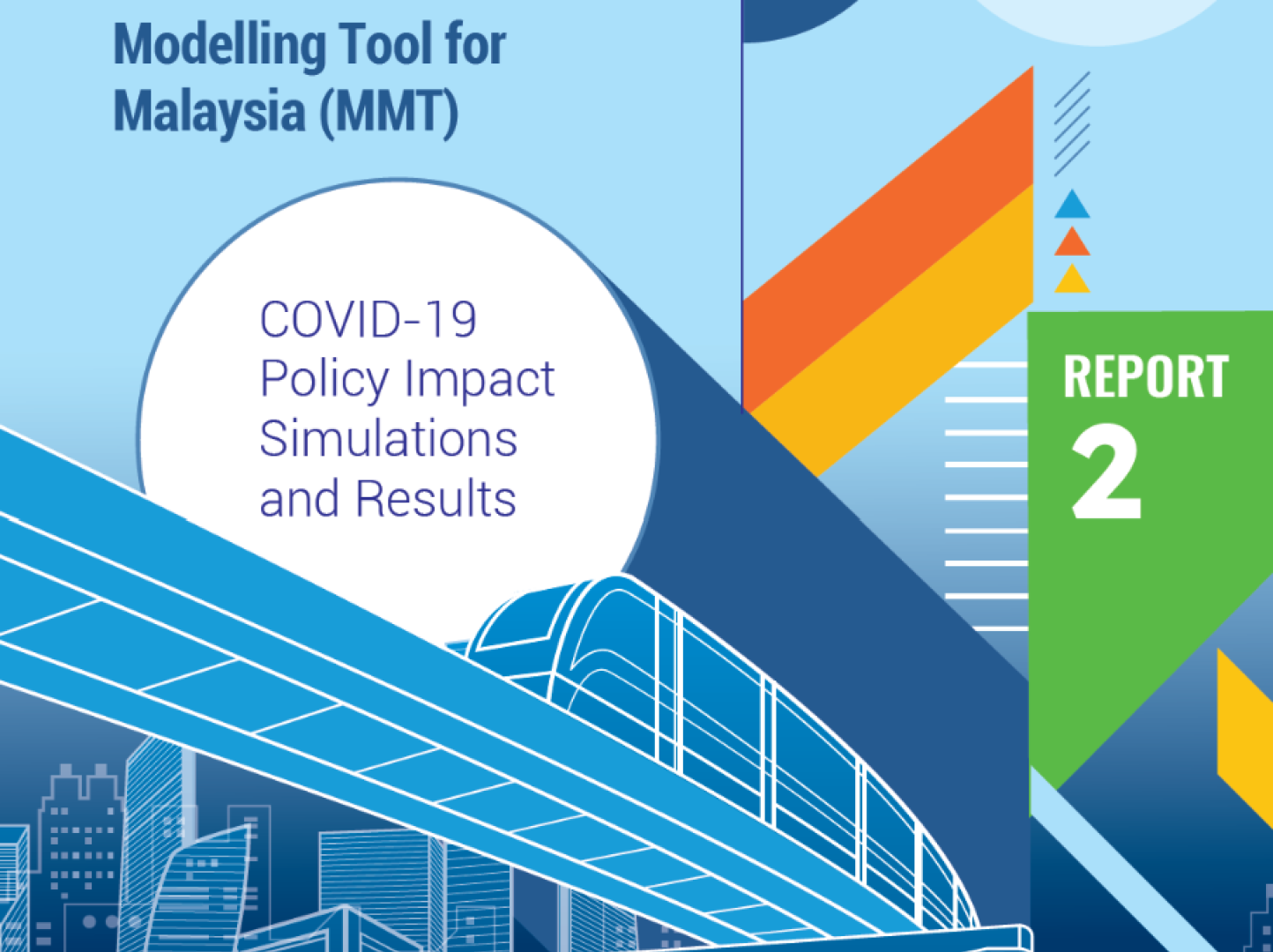Latest
The Sustainable Development Goals in Malaysia, Singapore and Brunei Darussalam
The Sustainable Development Goals are a global call to action to end poverty, protect the earth’s environment and climate, and ensure that people everywhere can enjoy peace and prosperity. These are the goals the UN is working on in Malaysia:
Take Action
09 February 2022
Act Now for Our Common Future
Embrace the possible that’s the call of the 17 Sustainable Development Goals, a blueprint for a better world.
Everyone can join the global movement for change.
ActNow is the United Nations campaign to inspire people to act for the Sustainable Development Goals.
1 of 5
Publication
09 August 2023
UN Country Results Report Malaysia 2022: Enabling Post-Pandemic Sustainable, and Inclusive Development in Malaysia
The UN Country Results Report 2022 is the third unified results report for the United Nations Country Team (UNCT) in Malaysia, and covers our work in Brunei Darussalam and Singapore.
It reports on the work and results of the 22 UN agencies, 9 resident and 13 non-residents, with programmatic activity in Malaysia.
As the country emerged from the pandemic and the recovery gathered pace, and as Malaysia also encountered new challenges, the UNCT continued to focus on the achievement of the SDGs and long-term sustainable development. Identified under four priorities - People, Prosperity, Planet and Peace, the work within the UNSDCF reflects the UN’s focus on ‘leaving no one behind’; on improving the plight of vulnerable groups; on finding solutions to deal with the climate emergency; and on promoting good governance.
The reported results reflect the UN’s key contributions to sustainable and inclusive development, and to working with the Government, the private sector, civil society, and academia to develop and implement solutions. These also demonstrate the multifaceted nature of the UN’s work as it seeks to promote greater coordination between stakeholders and improve outcomes for all to achieve the SDGs. This has involved policy support ranging from clean energy, environmental protection, women’s empowerment, ageing, cryptocurrency regulation, waste management, and healthcare reform.
1 of 5
Story
31 May 2023
Malaysia-UN SDG Trust Fund announces first call For proposals, offering USD3.6 Million for high-impact projects
Visit the Malaysia-UN SDG Trust Fund webpage here
The Malaysia-UN SDG Trust Fund, a collaborative initiative between the MySDG Foundation and the United Nations in Malaysia, supported by the Government of Malaysia, announces the launch of its 2023 Call for Proposals (CFP-2023). This first call for proposals aims to accelerate progress towards the Sustainable Development Goals (SDGs) across Malaysia, by focusing on groups and communities at risk of being left behind.
The CFP-2023 invites project proposals from UN agencies, Malaysian civil society organizations, non-governmental organizations, and academia engaged in SDG implementation and advocacy. A total sum of USD3.6 million (approximately MYR 16,200,000 based on USD1= MYR4.50 exchange rate) will be disbursed to approved projects, enabling their impactful implementation.
In her statement on the launch of CFP-2023, Karima El Korri, UN Resident Coordinator in Malaysia, emphasized that "at this pivotal halfway mark to 2030, the Malaysia-UN SDG Trust Fund presents a unique opportunity to support impactful and innovative initiatives aligned with Malaysia’s foremost SDG priorities.” She further added that “the Fund complements ongoing efforts of the government and various stakeholders to deliver on the principles, ambitions, and goals of the 2030 Agenda for Sustainable Development."
The Fund envisions annual calls for proposals until 2030, aiming to support catalytic interventions targeting those at risk of being left behind, and promote partnerships and a whole-of-society approach. It seeks to create equitable and inclusive pathways that enable the realization of socioeconomic rights for people across all regions of Malaysia. Projects should prioritize local actions that enhance lives and livelihoods and deliver wider SDG gains for vulnerable populations such as the unemployed and informal sector workers, indigenous people, women, youth, people with disabilities, older persons, migrants, refugees, stateless and undocumented persons. The Fund is anchored in three thematic pillars - People and Prosperity; Planet and Peace; and Partnership, encompassing twelve priority areas.
Tan Sri Abdul Wahid bin Omar, Chairman of the Board of Trustees of the MySDG Foundation, hailed the Fund as a “catalyst of SDG progress that leaves no one behind.” He called upon sustainable development champions to “step forward with innovative solutions that foster collaboration, engage community-based action, and generate tangible results.”
CFP-2023 welcomes project proposals seeking funds ranging from USD100,000 to USD500,000 (approximately MYR 450,000 to MYR 2,250,000 based on USD1= MYR4.50 exchange rate). Projects should have a minimum duration of six months and a maximum duration of 18 months, and adhere to the criteria detailed in the CFP-2023 brochure.
The CFP-2023 will be open from 1 June to 14 July 2023.
-Ends-
Malaysia-UN SDG Trust Fund: three thematic pillars and twelve priority areas.
People and Prosperity
Promoting an inclusive recovery from the COVID - 19 pandemic, addressing the poverty, nutritional and health challenges of affected and marginal and excluded groups (e.g., informal sector workers, the poor and vulnerable in peripheral regions including indigenous peoples, women, youth, migrants and refugees, undocumented persons, and persons with disabilities).
Levelling up wider SDG performance in key human development domains across regions, focusing on communities in lagging peripheral areas. Expanding resilience through greater social protection measures, focusing on excluded and under-served groups and those in informal work.
Addressing the specific human development needs of women at risk of being left behind.
Promoting work opportunities to the poor and vulnerable, those in informal work and those in remote locations, via access to skills training, financial services, commercial credit, and to decent jobs.
Addressing geographical and economic imbalances, especially those faced by communities living in remote locations, including by assisting them to unlock local comparative advantages (natural capital, sustainable exploitation of natural resources and products, enhanced tourism).
Planet
Building the resilience of communities (groups and localities) at most risk to the impacts of climate change through active adaptation efforts.
Tackling biodiversity loss, particularly for marginal communities which rely on the natural capital for their livelihoods.
Assisting marginal communities to tackle land, sea and river pollution, which blights their living conditions.
Peace and Partnership
Helping to build social and political cohesion between Malaysia's diverse communities.
Enabling the realization of key socioeconomic rights by marginal and excluded groups (e.g., the poor and vulnerable in peripheral regions including indigenous peoples, migrants and refugees, undocumented populations, and people with disabilities)
Enabling, within the law, the recognition of undocumented people and their social inclusion.
About MySDG Foundation:
Yayasan Matlamat Pembangunan Mampan Malaysia or The Foundation for Sustainable Development Goals Malaysia (MySDG Foundation) was established in 2022 under the Trustees (Incorporation) Act 1952 (Act 258). It is guided by the 2030 Agenda for Sustainable Development and its core principle of leaving no one behind. MySDG Foundation provides funding through grants, in support of the achievement of the SDGs in Malaysia. In early 2023, MySDG Foundation entered into collaboration with the United Nations through the Malaysia-UN SDG Trust Fund, a breakthrough initiative aimed to support SDG-focused projects that address national priorities, promote a multi-stakeholder approach and implement innovative and inclusive SDG-solutions across Malaysia. A key objective of MySDG Foundation is to strengthen its donor base, by mobilizing the continued support of the Ministry of Finance and raising funds and contributions from other donors within and outside Malaysia.
1 of 5
Publication
29 March 2023
Enhancing Human Capital Through Sexual & Reproductive Health Investments and Family Support Policies in Malaysia
This report, a joint collaboration between UNFPA Malaysia, The Ministry of Economy (previously Economic Planning Unit) of Malaysia & The Harvard T.H Chan School of Public Health focuses and evidences how Malaysia can enhance her human capital, via strategic investments in Sexual & Reprodutive Health as well as vital family support services in order to increase the county's female labour participation rate and in tandem achieve essential milestones, such as the 2030 SDGs and the realisation of the 12th Malaysia plan.
Review:
Every person has a dream. Every girl and woman should be able to complete her education, pursue her ambitions, and make a living that protects her from poverty and vulnerability. She also has the right to live a life free of violence.
Globally, women and girls face various risks, crises and vulnerabilities. Almost half of all pregnancies in the world are unintended, and the risk of death during and after pregnancy is high for them. Furthermore, they are often less educated and earn less than their male counterparts. Meanwhile, the pandemic has increased the number of unpaid female workers, leaving them vulnerable to income instability and lack of health and social benefits.
Malaysian women are not exempt. They still face issues such as maternal morbidity, poor-quality maternal care and high rates of cervical cancer. Furthermore, Malaysian families face huge economic burdens in bearing and rearing children and are not provided with adequate high-quality childcare, forcing women to stay at home to take care of their children and miss out on their career goals.
All of the examples outlined above pose significant drawbacks not only to girls, women and families alike, but to the national economy as well: in order for girls and women to contribute to the economy, as well as national development they must have optimal reproductive health to enable them to be productive.
Women’s greater economic productivity and increased labour participation as a whole will accelerate Malaysia’s progress towards achieving the Sustainable Development Goals (SDGs) – a set of 17 global goals that are essential to towards achieving peace and prosperity for everyone on the planet – and the Twelfth Malaysia Plan (12MP) which is designed to propel Malaysia into high-income status by year 2025 (as described in Section 1 of the report).
Therefore, in order to achieve these essential milestones, especially in light of the impact of the COVID-19 pandemic, Malaysia needs to invest in her women and girls now.
1 of 5
Take Action
13 March 2023
Be the Change Campaign
This World Water Day is about accelerating change to solve the water and sanitation crisis. And because water affects us all, we need everyone to take action. That means you!
This is a once-in-a-generation moment for the world to unite around water. Play your part. Do what you can.
1 of 5
Story
19 March 2024
We the Women campaign
Visit the We the Women page hereABOUT THE WE THE WOMEN CAMPAIGNWe the Women is a campaign of Women Rise for All, an initiative by the United Nations Deputy Secretary-General recognizing the transformative leadership of women leaders in keeping the promise of the Sustainable Development Goals.This year, the United Nations will host the Summit of the Future during the General Assembly in September. It is an opportune moment to create a new narrative for the future of our world that reflects and amplifies women’s voices.A GLOBAL MOVEMENTThe We the Women campaign aims to engage women around the world in shaping global solutions into the future. From a global survey and series of intergenerational dialogues to a film and multi-media exhibition, the campaign will reach out to women through various channels. The campaign invites women to share their thoughts, ideas, and aspirations—about the world they want. We the Women was launched at the margins of the 2023 SDG Summit by the United Nations Deputy Secretary-General Amina J. Mohammed and H.E. Svenja Schulze, Federal Minister for Economic Cooperation and Development of Germany.WE THE WOMEN GLOBAL SURVEYThe We the Women campaign starts with a Global Survey. The survey is asking women questions about how they see the future, their priorities, fears and hopes, and how global leaders can listen to them and support them as we collectively address issues, challenges and opportunities of the future.KEY OBJECTIVES OF THE WE THE WOMEN CAMPAIGNLISTENCrowdsource and capture the voices, experiences, and creativity of the world’s women to inform solutions to some of the most pressing challenges the world is facing.ENGAGEInform the outcome document of the Summit of the Future – the Pact for the Future – and beyond, to strengthen the international community’s ability to respond to the needs and perspectives of the women of the world.ACTAmplify women’s voices in a global campaign culminating in a multi-media moment at the Summit of the Future – expressed through videos, stories that shares thoughts, ideas, and aspirations—about the world women want.LISTEN. ENGAGE. ACT.Respond to the We the Women Global Survey here Follow the Women Rise for All page and the We the Women campaign on website and LinkedIn and join the Conversation on social media using the hashtags #WetheWomen #WomenRiseforAllWe the Women: https://unpartnerships.un.org/we-the-women
1 of 5
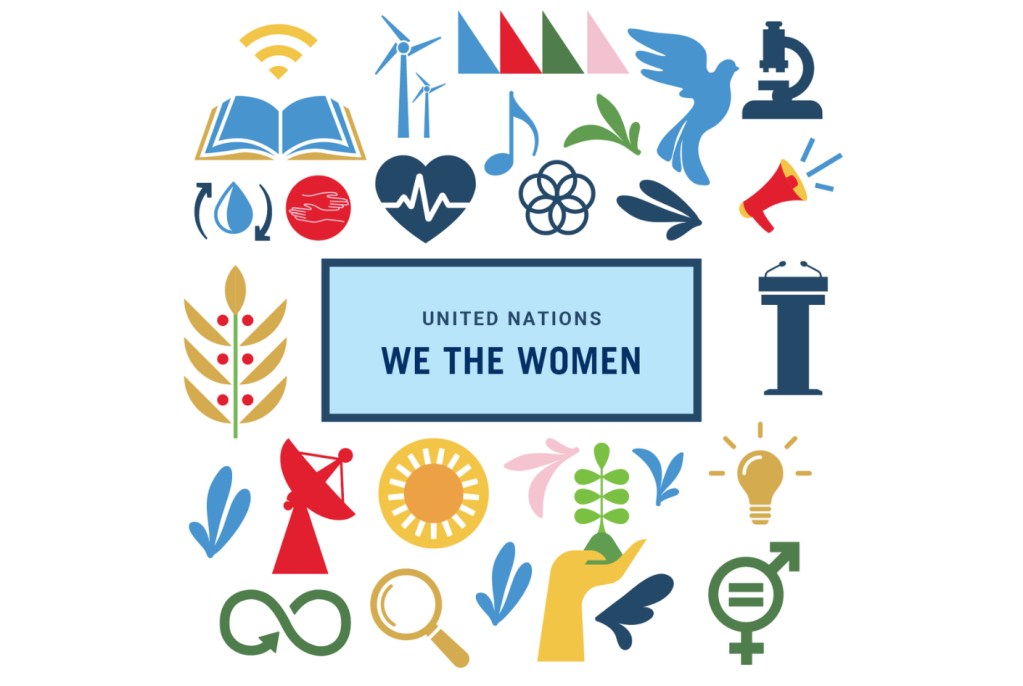
Story
07 March 2024
Op-ed: Invest in women: ending the patriarchy requires money on the table
The fight for women’s rights over the past fifty years is a story of progress. Women and girls have demolished barriers, dismantled stereotypes and driven progress towards a more just and equal world. Women’s rights were finally recognised as fundamental and universal human rights. Hundreds of millions more girls are in classrooms around the world. And pioneering leaders have smashed glass ceilings across the globe. But progress is under threat. And full equality remains light years away. Billions of women and girls face marginalization, injustice and discrimination, as millennia of male domination continue to shape societies. The persistent epidemic of gender-based violence disgraces humanity. Over four million girls are estimated to be at risk of female genital mutilation each year. Discrimination against women and girls remains perfectly legal in much of the world. In some places, that makes it difficult for women to own property, in others, it allows men to rape their wives with impunity.Meanwhile, global crises are hitting women and girls hardest. Wherever there’s conflict, climate disaster, poverty or hunger, women and girls suffer most. In every region of the world, more women than men go hungry. In both developed and developing countries, a backlash against women’s rights, including their sexual and reproductive rights, is stalling and even reversing progress. New technologies – which have such potential to dismantle inequalities – too often make matters worse. That can be because of unequal access, algorithms with baked-in bias, or misogynistic violence – from deep fakes to targeted harassment of specific women. At our current speed, full legal equality for women is some 300 years away; so is the end of child marriage. This rate of change is frankly insulting. Half of humanity can’t wait centuries for their rights. We need equality now. That means accelerating the pace of progress. And that relies on political ambition, and on investment – the theme of this year’s International Women’s Day. We need public and private investment in programmes to end violence against women, ensure decent work, and drive women’s inclusion and leadership in digital technologies, peacebuilding, climate action, and across all sectors of the economy. We must also urgently support women’s rights organizations fighting against stereotypes, battling to make women’s and girls’ voices heard, and challenging traditions and cultural norms. Currently they receive a paltry 0.1% of international development spending. That must change. Investment may sound far removed from women’s everyday lives. But it takes investment to give schoolgirls the same opportunities as schoolboys. It takes investment to provide digital education and develop skills. It takes investment to provide the childcare that enables caregivers, who are mainly mothers, to do paid work outside the home. And it takes investment to build inclusive communities and societies with the full participation of women and girls of all backgrounds. Putting money behind equality is the right thing to do, but it also makes financial sense. Supporting women to enter formal labour markets grows economies, boosts tax revenues and expands opportunities for all. Securing the investment we need in women and girls requires three things. First, increasing the availability of affordable, long-term finance for sustainable development, and tackling the debt crisis strangling many developing economies. Otherwise, countries simply won’t have the funds to invest in women and girls. We need immediate action to provide breathing space for countries with unbearable debt repayments looming, and to encourage multilateral development banks to leverage far more private finance at affordable costs. Over the long term, we must reform the international financial architecture and make it far more responsive to the needs of developing countries. Second, countries must prioritise equality for women and girls – recognising that equality is not only a matter of rights but the bedrock of peaceful, prosperous societies. That means governments actively addressing discrimination, spending on programmes to support women and girls, and ensuring policies, budgets and investments respond to their needs. Third, we need to increase the number of women in leadership positions. Having women in positions of power can help to drive investment in policies and programmes that respond to women and girls’ realities. I am particularly proud that since early in my tenure – and for the first time in history – we have equal numbers of women and men in senior management across the entire United Nations system. Equality is overdue. Ending the patriarchy requires money on the table – it’s time to cough up.
1 of 5
Story
08 February 2024
Affordable, accessible health care gets results: financial protection and people-centred care in Malaysia
Read the original story here
As a community nurse and midwife, Ismaziah Binti Ibrahim understands the importance of accessible maternal health care. The clinic where she works, Klinik Desa Broga in the Malaysian state of Selangor, is often the first point of contact between local pregnant women and the health system.
“In this village clinic, we provide services for mothers and children,” explains Ismaziah. “We perform urine checks, blood pressure checks and other necessary tests. If we encounter something difficult, we refer patients to doctors and hospitals.”
For some women, however, visiting a health centre can be difficult. “Sometimes, when mothers do go to the clinic, they don't talk, they feel shy,” she says. “New mothers also often face challenges because of the distance to health centres,” she says. For many, the cost of transport is a major barrier and if a partner or relative brings the mother to the clinic, it means missing out on work.
That’s why Ismaziah and a team of other nurse-midwives visit new mothers in their own homes. “When we go to their homes, it’s more personal. We know our patients and they are more comfortable and willing to talk to us,” she explains. In these familiar surroundings, the nurse-midwives counsel the mothers on nutrition, cleanliness and breastfeeding, and encourage mothers to create healthy environments for their newborns.
The cost for this government healthcare is minimal and home visits remove other costs such as transport and lost work. "In Malaysia, healthcare costs in the government health care services are the most affordable,” explains Ismaziah. “Patients tell us that they prefer government health care."
These home postnatal care visits are a great example of health care that puts patients and their specific needs at the centre of care. And this approach gets results. By providing accessible, affordable postnatal care, Malaysia has achieved the Sustainable Development Goal related to maternal and child mortality.
Unfortunately, however, for many families in the World Health Organization (WHO) Western Pacific Region accessing health care comes at a high cost. A new WHO report finds that 1 in 5 – or 385 million people – in the Western Pacific face financial hardship when seeking care. People are defined as facing financial hardship when more than 10% of a household’s income is spent on out-of-pocket health care costs. In a concerning trend, the number of people experiencing financial hardship has doubled over the last two decades.
That’s why, on Universal Health Coverage (UHC) Day, WHO calls for leaders to invest in universal health coverage with a focus on ensuring financial protection for all.
UHC is fundamental for realizing the For the Future vision to make the Western Pacific the world’s safest and healthiest region. But without strong and effective financial protection, this cannot be achieved.
WHO is working with Member States in the Western Pacific to develop health financing policies that reduce financial hardship. As these efforts progress, more people will have access to affordable care. For Ismaziah, this is something to be celebrated. “I feel proud to be a community nurse and midwife,” she shares. “In the future, we will strive to be better than before and make a positive impact on others. My hope is for the people of Malaysia to be healthy and safe.”
1 of 5
Story
08 February 2024
"Peace can achieve wonders that wars never will"
View the original post here
Mr. President of the General Assembly, Excellencies, Ladies and gentlemen,
Let me begin by extending my very best wishes for 2024.
I wish health and happiness for you and your families -- and peace for our world.
Our organization was founded on the pursuit of peace.
Peace is our raison d’être.
Yet as I scan the landscape of today’s world, the one thing missing most dramatically is peace.
And by that, I mean peace in all its dimensions.
As conflicts rage and geopolitical divisions grow, peace in our world is threatened.
As polarization deepens and human rights are trampled, peace within communities is undermined.
As inequalities explode, peace with justice is shattered.
As we continue our addiction to fossil fuels, we make a mockery of any notion of peace with nature.
Around the globe, and across the range of issues, peace is the missing piece.
People want peace and security.
People want peace and dignity.
And, frankly, they want peace and quiet.
There is so much anger and hate and noise in our world today.
Every day and at every turn, it seems – it’s war.
Terrible conflicts that are killing and maiming civilians in record numbers.
Wars of words. Turf wars. Culture wars.
So many peddling the perverse math that says you multiply support by dividing people.
This is especially troubling in a year when half of humanity will go to the polls.
Meanwhile, more and more families are falling behind.
More and more countries are drowning in debt.
More and more people are losing trust in institutions and faith in the political process.
Peace is the way out of these interlinked crises.
Peace is more than a noble vision.
Peace is a rallying cry. It is a call to action.
Our obligation is to act together for peace in all its dimensions.
Excellencies,
Despite the turbulence of our times, there are reasons for hope.
At the SDG Summit, world leaders endorsed an SDG Stimulus and the need for far-reaching reforms of the international financial architecture.
Countries also reached agreement last year on the High Seas Treaty to protect precious marine biodiversity from pollution and overfishing.
We are making some headway on climate justice. The Loss and Damage Fund – provided that it is well-resourced – will help vulnerable countries recover from the impacts of extreme weather.
The Security Council agreed to our years-long call to back peace enforcement and counter-terrorism operations led by regional partners, notably the African Union, with mandates from the Council and supported by assessed contributions.
The new High Level Advisory Body on Artificial Intelligence launched a global conversation on how this all-pervading technology can benefit us all.
Looking ahead, at the Summit of the Future in September, we have a chance to shape multilateralism for years to come.
And indeed our world badly needs:
Reform of the Security Council.
Reform of the international financial system.
The meaningful engagement of youth in decision-making.
A Global Digital Compact to maximize the benefits of new technologies and minimize the risks.
An emergency platform to improve the international response to complex global shocks.
I see a truly dynamic effort to build a more effective, inclusive and renewed multilateralism tuned to the 21st century and our increasingly multipolar world.
And you are at the heart of this essential effort.
And peace is at the heart of all we do.
Excellencies,
For millions of people caught up in conflict around the world, life is a deadly, daily, hungry hell.
Record numbers are fleeing their homes in search of safety.
They are crying out for peace.
We must hear them, and act.
In the immediate term, we must continue to push for peace across the globe.
The situation in Gaza is a festering wound on our collective conscience that threatens the entire region.
Nothing justifies the horrific terror attacks launched by Hamas against Israel on 7 October.
Nor is there any justification for the collective punishment of the Palestinian people.
Yet, Israeli military operations have resulted in destruction and death in Gaza at a scale and speed without parallel since I became Secretary-General.
I am especially alarmed by reports that the Israeli military intends to focus next on Rafah – where hundreds of thousands of Palestinians have been squeezed in a desperate search for safety.
Such an action would exponentially increase what is already a humanitarian nightmare with untold regional consequences.
It is time for an immediate humanitarian ceasefire and the immediate and unconditional release of all hostages.
This must rapidly lead to irreversible actions towards a two-state solution, based on United Nations resolutions, international law and previous agreements.
In Ukraine, I repeat my call for a just and sustainable peace, in line with the UN Charter and international law -- for Ukraine, for Russia and for the world.
In a swathe of countries across the Sahel, terrorism is spiking, and civilians are paying a terrible price. We will not relent in supporting the people of the Sahel in these troubling times.
Collective action is essential in the Horn of Africa to consolidate the hard-won gains against Al Shabaab and to preserve the fundamental principle of territorial integrity avoiding new crises.
The fighting must stop in Sudan before it destroys even more lives and spreads. In Libya, while a ceasefire holds, the Libyan people deserve sustained peace and stability, starting with a commitment to free and fair elections.
In eastern Democratic Republic of [the] Congo, I call on all armed groups to lay down their weapons and I urge regional leaders to prioritize dialogue.
In Yemen, I appeal to all parties to focus on the path to peace and also to de-escalate tensions in the Red Sea based on the principle of freedom of navigation.
In Myanmar, we need sustained international and regional attention to help urgently forge a path towards a democratic transition and return to civilian rule.
In Haiti, lawlessness is surging and millions face acute food insecurity. The Multinational Security Support mission must be deployed without delay and I hope all obstacles will be removed, and I also urge Member States to provide the necessary financial support.
And in the western Balkans, some leaders continue to stoke tensions and ethno-nationalistic rhetoric. I urge action for reconciliation, stability and economic prosperity across the region.
Excellencies,
If countries fulfilled their obligations under the Charter, every person’s right to a life of peace and dignity would be guaranteed.
But governments are ignoring and undermining the very tenets of multilateralism – with zero accountability.
The United Nations Security Council – the primary platform for questions of global peace – is deadlocked by geopolitical fissures.
This is not the first time the Council has been divided.
But it is the worst.
Today’s dysfunction is deeper and more dangerous.
During the Cold War, well-established mechanisms helped manage superpower relations.
In today’s multipolar world, such mechanisms are missing. And so our world is entering an age of chaos.
We are seeing the results: a dangerous and unpredictable free-for-all with total impunity.
After decades of nuclear disarmament, states are competing to make their nuclear arsenals faster, stealthier and more accurate.
New potential domains of conflict, and weapons of war, are being developed without guardrails, creating new ways to kill each other – and for humanity to annihilate itself.
As conflicts proliferate, global humanitarian needs are at an all-time high, but funding is not keeping pace.
Humanitarian workers are saving lives and easing suffering around the world.
I pay tribute to their heroic efforts and to those aid workers who have paid the ultimate price, most recently and tragically in Gaza.
Excellencies,
We need to strengthen and renew global peace and security frameworks to deal with the complexities of today’s multipolar world.
That is the rationale for our New Agenda for Peace.
First and foremost, the United Nations Security Council must be able to take decisions and implement them. And it must become more representative.
It is totally unacceptable that the African continent is still waiting for a permanent seat.
The Council’s working methods must also be updated so that it can make progress – even when Members are sharply divided.
The New Agenda for Peace addresses strategic risks through a recommitment to eliminating nuclear weapons and stepped-up efforts to prevent conflict.
It proposes measures to mitigate the impact of geopolitical competition on people and prevent the fragmentation of global trade rules, supply chains, currencies and the internet.
It presents a view of prevention that addresses violence in all its forms and at all levels.
It recognizes the links between sustainable development, climate action, and peace; and it calls for the transformation of gendered power dynamics; the meaningful inclusion of women and young people in all peace processes; and respect for all human rights: civil, political, economic, social and cultural.
It underscores the need for peacekeeping missions with realistic mandates and well-defined transition and exit strategies.
And it urges the development of norms and frameworks to regulate the use of new technologies, including Artificial Intelligence, in the military domain. Excellencies, We also need peace within communities. Around the world, we are seeing communities divided by rising hate speech, discrimination, extremism and human rights abuses. Antisemitism, anti-Muslim bigotry, the persecution of minority Christian communities and white supremacist ideology are on the rise. Authoritarianism is growing. Civic space is shrinking. The media is under attack. Discrimination against women and girls, and gender-based violence, are the most widespread human rights abuses in our world. I see two fundamental reasons for all of this. First, the speed and reach of disinformation and hate has increased exponentially in the digital age. The pursuit of profit has helped extremists to sow division. Second, real and perceived inequalities, economic deprivation, and rapid social and economic change are feeding people’s fears. Global standards of living may be higher than ever, but six out of seven people around the world report feeling anxious and fearful about their future. The United Nations is supporting efforts to maximize investments in social cohesion and prioritize the security of every individual. That is why we are calling for a renewed social contract, based on trust, justice and inclusion and anchored in human rights. We are advancing my Call to Action for Human Rights. We are promoting women’s full and equal participation and leadership in all sectors of society, as a matter of urgency. And we are pressing tech companies to assume their responsibility to stop amplifying and capitalizing on the spread of toxic disinformation and other harmful content. Our forthcoming code of conduct for information integrity, to be published ahead of the Summit of the Future, will help guide decisionmakers to make the digital space inclusive and safer for all, while defending the right to freedom of expression. Leaders across the board have a responsibility to ensure that people feel included and represented; that diversity is fully recognized as a strength; and that every community feels valued in itself, and enjoys a full place in society as a whole.
Excellencies,
Beyond tensions in the world and within communities, we need peace with justice.
Inequalities and injustice are fuel for a world at war with itself.
And conflicts are stoking further inequalities and injustice.
Take the tale of two canals.
Trade via the Suez Canal is down by 42 percent, since the start of Houthi attacks on shipping in the Red Sea more than three months ago.
Trade via the Panama Canal is down 36 percent in the past month, because of low water levels – a byproduct of the climate crisis.
Whether the cause is conflict or climate, the result is the same: disruption to global supply chains and increased costs for everybody.
Developing economies are particularly vulnerable to these disruptions.
Sustainable, inclusive development hinges on peace.
And delivering the Sustainable Development Goals is our most effective way of building peace and prosperity.
Yet we face a development emergency. The seismic shock of the COVID-19 pandemic was followed by a sharp acceleration in global tensions – and global prices – when Russia invaded Ukraine.
Developing economies were sent reeling. Many still are.
Today’s global economic outlook largely ignores the elephant in the room: developing countries are experiencing their worst half-decade since the early 1990s.
Many face unpayable debt service costs, which are now at record levels.
The world’s poorest countries will owe more in debt service this year than their public spending on health, education, and infrastructure combined.
Meanwhile, governments are being forced to cut back on investments and essential services.
All these issues will be on the agenda at the Fourth International Conference on Small Island Developing States in May, and the Third [International] Conference on Landlocked Developing Countries in June.
Excellencies,
To keep the promise of the SDGs, we need progress in two crucial areas.
First, finance. We are pushing for an SDG Stimulus of 500 billion US dollars annually in affordable long-term finance for developing countries.
The SDG Stimulus calls for urgent action on debt, including breathing space for countries facing impossible repayment schedules.
I have invited a small number of Heads of State to work with me to make the Stimulus a reality.
With your support, we can significantly and immediately increase the capital and capacity of Multilateral Development Banks and help get developing economies back on track. Positive steps have been made by the leaders of the banks, but there is a long way to go. Second, we must keep working to usher in a new Bretton Woods moment, with an international financial architecture that responds to the needs of all countries.
Today’s architecture is outdated, dysfunctional and unfair.
It favours the rich countries that designed it nearly 80 years ago.
It fails to offer countries the affordable finance required to meet our shared goals.
And it does not fulfil the basic foundation unction of providing a financial safety net for all developing countries.
The Summit of the Future will consider the need for deep reforms to make financial institutions and frameworks truly universal and inclusive.
Excellencies,
We must also harness the power of technology to advance the Sustainable Development Goals.
From healthcare to education, from climate action to food systems, generative Artificial Intelligence is the most important potential tool to build inclusive, green, sustainable economies and societies.
But AI is already creating risks around disinformation, privacy, and bias.
It is concentrated in very few companies – and even fewer countries.
Technology must reduce inequalities, not reproduce them – or pit people against each other.
AI will affect all of humankind, so we need a universal approach to deal with it.
Our Advisory Body on Artificial Intelligence reflects the central convening role of the United Nations – bringing together governments, private companies, academia and civil society.
The Body’s recommendations will feed into the Global Digital Compact proposed for adoption at the Summit of the Future.
We must move fast, be creative, and work together to ensure adequate guardrails and ethical standards, promote transparency, and build capacities in developing countries.
Artificial Intelligence must not replace human agency.
It was created by humans and must always be under human control.
Excellencies,
We must also make peace with the planet.
Humanity has waged a war we can only lose: our war with nature.
It is a crazy fight to pick.
We are detonating systems that sustain us:
Spewing out emissions causing our climate to implode; poisoning land, sea and air with pollution, and decimating biodiversity, causing ecosystems to collapse.
We have many important milestones, including: October’s UN Biodiversity Conference, November’s COP29, and December’s Conference on the UN Convention to Combat Desertification.
Excellencies,
The climate crisis remains the defining challenge of our time.
The coming years will largely determine whether we can limit global temperature rise to 1.5 degrees.
To stay within that limit, we must cut emissions 45 percent by 2030, compared with 2010 levels. And we need emissions to have peaked by 2025.
The good news is, we have never been better equipped to prevent climate breakdown. And the benefits of renewables are clearer every year.
We must seize the momentum by taking action in three areas: Nationally Determined Contributions; phasing out fossil fuels; and finance.
By 2025, every country must commit to new national climate plans aligned with the 1.5-degree limit.
I am mobilizing the entire UN system to assist countries to do so.
New national plans should cover all emissions and sectors.
They should map a just transition to clean energy.
And they must be backed-up by robust policies and regulations – from an effective carbon price, to ending fossil fuel subsidies.
For developing countries, this is a chance to create national climate plans that double as national transition plans and national investment plans:
To attract capital and investments; to chart a just transition to a net zero future; and to underpin sustainable development for generations to come.
For the G20, this is an opportunity to show true leadership on the global stage by accelerating a just, equitable fossil fuel phase-out.
Excellencies,
The fossil fuel era is on its last legs.
The renewable energy revolution is unstoppable.
But we must act this year to ensure that the transition is just for people and planet – and that it will be fast enough to prevent full-on climate catastrophe,
That requires tripling global renewable energy capacity and doubling energy efficiency by 2030 – as agreed at COP28.
It means working to ensure the production and trade of minerals critical to the energy transitions are just, sustainable and provide maximum added value in the countries supplying the raw materials in the first place. Developing countries must not be only producers of raw materials; they must be much higher in the level of capacity to transform them. The Panel on Critical Energy Transition Minerals will develop voluntary principles by the end of the year.
Excellencies,
A just transition means urgent action to unlock the finance developing countries need to leapfrog fossil fuel dependence while bringing clean power to all.
Our Climate Solidarity Pact urges big emitters to make extra efforts to cut emissions and wealthier countries to support emerging economies to do so.
I urge countries to put it into effect.
And I welcome Brazil’s commitment to bring climate and finance discussions together as G20 President.
At a minimum, developed countries must clarify the delivery of the $100 billion, and explain how they will double adaptation funding, to at least $40 billion a year, by 2025.
At COP29, all countries must agree on an ambitious new climate finance goal.
We should explore innovative sources of climate finance.
And the Loss and Damage Fund must be up and running as quickly as possible – and with significant contributions.
Countries on the frontline of climate chaos are entitled to far greater support.
Excellencies,
This is a full agenda. In one form or another, every element connects to the most essential of all human endeavours: the pursuit of peace.
Peace can achieve wonders that wars never will.
Wars destroy.
Peace builds.
But in today’s troubled world, building peace is a conscious, bold and even radical act.
It is humanity’s greatest responsibility. And that responsibility belongs to us all – individually and collectively.
In this difficult and divided moment, let’s meet that obligation for today and future generations.
Starting here. Starting now.
For my part, I can guarantee that I will never give up pushing for peace.
Thank you.
Let me begin by extending my very best wishes for 2024.
I wish health and happiness for you and your families -- and peace for our world.
Our organization was founded on the pursuit of peace.
Peace is our raison d’être.
Yet as I scan the landscape of today’s world, the one thing missing most dramatically is peace.
And by that, I mean peace in all its dimensions.
As conflicts rage and geopolitical divisions grow, peace in our world is threatened.
As polarization deepens and human rights are trampled, peace within communities is undermined.
As inequalities explode, peace with justice is shattered.
As we continue our addiction to fossil fuels, we make a mockery of any notion of peace with nature.
Around the globe, and across the range of issues, peace is the missing piece.
People want peace and security.
People want peace and dignity.
And, frankly, they want peace and quiet.
There is so much anger and hate and noise in our world today.
Every day and at every turn, it seems – it’s war.
Terrible conflicts that are killing and maiming civilians in record numbers.
Wars of words. Turf wars. Culture wars.
So many peddling the perverse math that says you multiply support by dividing people.
This is especially troubling in a year when half of humanity will go to the polls.
Meanwhile, more and more families are falling behind.
More and more countries are drowning in debt.
More and more people are losing trust in institutions and faith in the political process.
Peace is the way out of these interlinked crises.
Peace is more than a noble vision.
Peace is a rallying cry. It is a call to action.
Our obligation is to act together for peace in all its dimensions.
Excellencies,
Despite the turbulence of our times, there are reasons for hope.
At the SDG Summit, world leaders endorsed an SDG Stimulus and the need for far-reaching reforms of the international financial architecture.
Countries also reached agreement last year on the High Seas Treaty to protect precious marine biodiversity from pollution and overfishing.
We are making some headway on climate justice. The Loss and Damage Fund – provided that it is well-resourced – will help vulnerable countries recover from the impacts of extreme weather.
The Security Council agreed to our years-long call to back peace enforcement and counter-terrorism operations led by regional partners, notably the African Union, with mandates from the Council and supported by assessed contributions.
The new High Level Advisory Body on Artificial Intelligence launched a global conversation on how this all-pervading technology can benefit us all.
Looking ahead, at the Summit of the Future in September, we have a chance to shape multilateralism for years to come.
And indeed our world badly needs:
Reform of the Security Council.
Reform of the international financial system.
The meaningful engagement of youth in decision-making.
A Global Digital Compact to maximize the benefits of new technologies and minimize the risks.
An emergency platform to improve the international response to complex global shocks.
I see a truly dynamic effort to build a more effective, inclusive and renewed multilateralism tuned to the 21st century and our increasingly multipolar world.
And you are at the heart of this essential effort.
And peace is at the heart of all we do.
Excellencies,
For millions of people caught up in conflict around the world, life is a deadly, daily, hungry hell.
Record numbers are fleeing their homes in search of safety.
They are crying out for peace.
We must hear them, and act.
In the immediate term, we must continue to push for peace across the globe.
The situation in Gaza is a festering wound on our collective conscience that threatens the entire region.
Nothing justifies the horrific terror attacks launched by Hamas against Israel on 7 October.
Nor is there any justification for the collective punishment of the Palestinian people.
Yet, Israeli military operations have resulted in destruction and death in Gaza at a scale and speed without parallel since I became Secretary-General.
I am especially alarmed by reports that the Israeli military intends to focus next on Rafah – where hundreds of thousands of Palestinians have been squeezed in a desperate search for safety.
Such an action would exponentially increase what is already a humanitarian nightmare with untold regional consequences.
It is time for an immediate humanitarian ceasefire and the immediate and unconditional release of all hostages.
This must rapidly lead to irreversible actions towards a two-state solution, based on United Nations resolutions, international law and previous agreements.
In Ukraine, I repeat my call for a just and sustainable peace, in line with the UN Charter and international law -- for Ukraine, for Russia and for the world.
In a swathe of countries across the Sahel, terrorism is spiking, and civilians are paying a terrible price. We will not relent in supporting the people of the Sahel in these troubling times.
Collective action is essential in the Horn of Africa to consolidate the hard-won gains against Al Shabaab and to preserve the fundamental principle of territorial integrity avoiding new crises.
The fighting must stop in Sudan before it destroys even more lives and spreads. In Libya, while a ceasefire holds, the Libyan people deserve sustained peace and stability, starting with a commitment to free and fair elections.
In eastern Democratic Republic of [the] Congo, I call on all armed groups to lay down their weapons and I urge regional leaders to prioritize dialogue.
In Yemen, I appeal to all parties to focus on the path to peace and also to de-escalate tensions in the Red Sea based on the principle of freedom of navigation.
In Myanmar, we need sustained international and regional attention to help urgently forge a path towards a democratic transition and return to civilian rule.
In Haiti, lawlessness is surging and millions face acute food insecurity. The Multinational Security Support mission must be deployed without delay and I hope all obstacles will be removed, and I also urge Member States to provide the necessary financial support.
And in the western Balkans, some leaders continue to stoke tensions and ethno-nationalistic rhetoric. I urge action for reconciliation, stability and economic prosperity across the region.
Excellencies,
If countries fulfilled their obligations under the Charter, every person’s right to a life of peace and dignity would be guaranteed.
But governments are ignoring and undermining the very tenets of multilateralism – with zero accountability.
The United Nations Security Council – the primary platform for questions of global peace – is deadlocked by geopolitical fissures.
This is not the first time the Council has been divided.
But it is the worst.
Today’s dysfunction is deeper and more dangerous.
During the Cold War, well-established mechanisms helped manage superpower relations.
In today’s multipolar world, such mechanisms are missing. And so our world is entering an age of chaos.
We are seeing the results: a dangerous and unpredictable free-for-all with total impunity.
After decades of nuclear disarmament, states are competing to make their nuclear arsenals faster, stealthier and more accurate.
New potential domains of conflict, and weapons of war, are being developed without guardrails, creating new ways to kill each other – and for humanity to annihilate itself.
As conflicts proliferate, global humanitarian needs are at an all-time high, but funding is not keeping pace.
Humanitarian workers are saving lives and easing suffering around the world.
I pay tribute to their heroic efforts and to those aid workers who have paid the ultimate price, most recently and tragically in Gaza.
Excellencies,
We need to strengthen and renew global peace and security frameworks to deal with the complexities of today’s multipolar world.
That is the rationale for our New Agenda for Peace.
First and foremost, the United Nations Security Council must be able to take decisions and implement them. And it must become more representative.
It is totally unacceptable that the African continent is still waiting for a permanent seat.
The Council’s working methods must also be updated so that it can make progress – even when Members are sharply divided.
The New Agenda for Peace addresses strategic risks through a recommitment to eliminating nuclear weapons and stepped-up efforts to prevent conflict.
It proposes measures to mitigate the impact of geopolitical competition on people and prevent the fragmentation of global trade rules, supply chains, currencies and the internet.
It presents a view of prevention that addresses violence in all its forms and at all levels.
It recognizes the links between sustainable development, climate action, and peace; and it calls for the transformation of gendered power dynamics; the meaningful inclusion of women and young people in all peace processes; and respect for all human rights: civil, political, economic, social and cultural.
It underscores the need for peacekeeping missions with realistic mandates and well-defined transition and exit strategies.
And it urges the development of norms and frameworks to regulate the use of new technologies, including Artificial Intelligence, in the military domain. Excellencies, We also need peace within communities. Around the world, we are seeing communities divided by rising hate speech, discrimination, extremism and human rights abuses. Antisemitism, anti-Muslim bigotry, the persecution of minority Christian communities and white supremacist ideology are on the rise. Authoritarianism is growing. Civic space is shrinking. The media is under attack. Discrimination against women and girls, and gender-based violence, are the most widespread human rights abuses in our world. I see two fundamental reasons for all of this. First, the speed and reach of disinformation and hate has increased exponentially in the digital age. The pursuit of profit has helped extremists to sow division. Second, real and perceived inequalities, economic deprivation, and rapid social and economic change are feeding people’s fears. Global standards of living may be higher than ever, but six out of seven people around the world report feeling anxious and fearful about their future. The United Nations is supporting efforts to maximize investments in social cohesion and prioritize the security of every individual. That is why we are calling for a renewed social contract, based on trust, justice and inclusion and anchored in human rights. We are advancing my Call to Action for Human Rights. We are promoting women’s full and equal participation and leadership in all sectors of society, as a matter of urgency. And we are pressing tech companies to assume their responsibility to stop amplifying and capitalizing on the spread of toxic disinformation and other harmful content. Our forthcoming code of conduct for information integrity, to be published ahead of the Summit of the Future, will help guide decisionmakers to make the digital space inclusive and safer for all, while defending the right to freedom of expression. Leaders across the board have a responsibility to ensure that people feel included and represented; that diversity is fully recognized as a strength; and that every community feels valued in itself, and enjoys a full place in society as a whole.
Excellencies,
Beyond tensions in the world and within communities, we need peace with justice.
Inequalities and injustice are fuel for a world at war with itself.
And conflicts are stoking further inequalities and injustice.
Take the tale of two canals.
Trade via the Suez Canal is down by 42 percent, since the start of Houthi attacks on shipping in the Red Sea more than three months ago.
Trade via the Panama Canal is down 36 percent in the past month, because of low water levels – a byproduct of the climate crisis.
Whether the cause is conflict or climate, the result is the same: disruption to global supply chains and increased costs for everybody.
Developing economies are particularly vulnerable to these disruptions.
Sustainable, inclusive development hinges on peace.
And delivering the Sustainable Development Goals is our most effective way of building peace and prosperity.
Yet we face a development emergency. The seismic shock of the COVID-19 pandemic was followed by a sharp acceleration in global tensions – and global prices – when Russia invaded Ukraine.
Developing economies were sent reeling. Many still are.
Today’s global economic outlook largely ignores the elephant in the room: developing countries are experiencing their worst half-decade since the early 1990s.
Many face unpayable debt service costs, which are now at record levels.
The world’s poorest countries will owe more in debt service this year than their public spending on health, education, and infrastructure combined.
Meanwhile, governments are being forced to cut back on investments and essential services.
All these issues will be on the agenda at the Fourth International Conference on Small Island Developing States in May, and the Third [International] Conference on Landlocked Developing Countries in June.
Excellencies,
To keep the promise of the SDGs, we need progress in two crucial areas.
First, finance. We are pushing for an SDG Stimulus of 500 billion US dollars annually in affordable long-term finance for developing countries.
The SDG Stimulus calls for urgent action on debt, including breathing space for countries facing impossible repayment schedules.
I have invited a small number of Heads of State to work with me to make the Stimulus a reality.
With your support, we can significantly and immediately increase the capital and capacity of Multilateral Development Banks and help get developing economies back on track. Positive steps have been made by the leaders of the banks, but there is a long way to go. Second, we must keep working to usher in a new Bretton Woods moment, with an international financial architecture that responds to the needs of all countries.
Today’s architecture is outdated, dysfunctional and unfair.
It favours the rich countries that designed it nearly 80 years ago.
It fails to offer countries the affordable finance required to meet our shared goals.
And it does not fulfil the basic foundation unction of providing a financial safety net for all developing countries.
The Summit of the Future will consider the need for deep reforms to make financial institutions and frameworks truly universal and inclusive.
Excellencies,
We must also harness the power of technology to advance the Sustainable Development Goals.
From healthcare to education, from climate action to food systems, generative Artificial Intelligence is the most important potential tool to build inclusive, green, sustainable economies and societies.
But AI is already creating risks around disinformation, privacy, and bias.
It is concentrated in very few companies – and even fewer countries.
Technology must reduce inequalities, not reproduce them – or pit people against each other.
AI will affect all of humankind, so we need a universal approach to deal with it.
Our Advisory Body on Artificial Intelligence reflects the central convening role of the United Nations – bringing together governments, private companies, academia and civil society.
The Body’s recommendations will feed into the Global Digital Compact proposed for adoption at the Summit of the Future.
We must move fast, be creative, and work together to ensure adequate guardrails and ethical standards, promote transparency, and build capacities in developing countries.
Artificial Intelligence must not replace human agency.
It was created by humans and must always be under human control.
Excellencies,
We must also make peace with the planet.
Humanity has waged a war we can only lose: our war with nature.
It is a crazy fight to pick.
We are detonating systems that sustain us:
Spewing out emissions causing our climate to implode; poisoning land, sea and air with pollution, and decimating biodiversity, causing ecosystems to collapse.
We have many important milestones, including: October’s UN Biodiversity Conference, November’s COP29, and December’s Conference on the UN Convention to Combat Desertification.
Excellencies,
The climate crisis remains the defining challenge of our time.
The coming years will largely determine whether we can limit global temperature rise to 1.5 degrees.
To stay within that limit, we must cut emissions 45 percent by 2030, compared with 2010 levels. And we need emissions to have peaked by 2025.
The good news is, we have never been better equipped to prevent climate breakdown. And the benefits of renewables are clearer every year.
We must seize the momentum by taking action in three areas: Nationally Determined Contributions; phasing out fossil fuels; and finance.
By 2025, every country must commit to new national climate plans aligned with the 1.5-degree limit.
I am mobilizing the entire UN system to assist countries to do so.
New national plans should cover all emissions and sectors.
They should map a just transition to clean energy.
And they must be backed-up by robust policies and regulations – from an effective carbon price, to ending fossil fuel subsidies.
For developing countries, this is a chance to create national climate plans that double as national transition plans and national investment plans:
To attract capital and investments; to chart a just transition to a net zero future; and to underpin sustainable development for generations to come.
For the G20, this is an opportunity to show true leadership on the global stage by accelerating a just, equitable fossil fuel phase-out.
Excellencies,
The fossil fuel era is on its last legs.
The renewable energy revolution is unstoppable.
But we must act this year to ensure that the transition is just for people and planet – and that it will be fast enough to prevent full-on climate catastrophe,
That requires tripling global renewable energy capacity and doubling energy efficiency by 2030 – as agreed at COP28.
It means working to ensure the production and trade of minerals critical to the energy transitions are just, sustainable and provide maximum added value in the countries supplying the raw materials in the first place. Developing countries must not be only producers of raw materials; they must be much higher in the level of capacity to transform them. The Panel on Critical Energy Transition Minerals will develop voluntary principles by the end of the year.
Excellencies,
A just transition means urgent action to unlock the finance developing countries need to leapfrog fossil fuel dependence while bringing clean power to all.
Our Climate Solidarity Pact urges big emitters to make extra efforts to cut emissions and wealthier countries to support emerging economies to do so.
I urge countries to put it into effect.
And I welcome Brazil’s commitment to bring climate and finance discussions together as G20 President.
At a minimum, developed countries must clarify the delivery of the $100 billion, and explain how they will double adaptation funding, to at least $40 billion a year, by 2025.
At COP29, all countries must agree on an ambitious new climate finance goal.
We should explore innovative sources of climate finance.
And the Loss and Damage Fund must be up and running as quickly as possible – and with significant contributions.
Countries on the frontline of climate chaos are entitled to far greater support.
Excellencies,
This is a full agenda. In one form or another, every element connects to the most essential of all human endeavours: the pursuit of peace.
Peace can achieve wonders that wars never will.
Wars destroy.
Peace builds.
But in today’s troubled world, building peace is a conscious, bold and even radical act.
It is humanity’s greatest responsibility. And that responsibility belongs to us all – individually and collectively.
In this difficult and divided moment, let’s meet that obligation for today and future generations.
Starting here. Starting now.
For my part, I can guarantee that I will never give up pushing for peace.
Thank you.
1 of 5
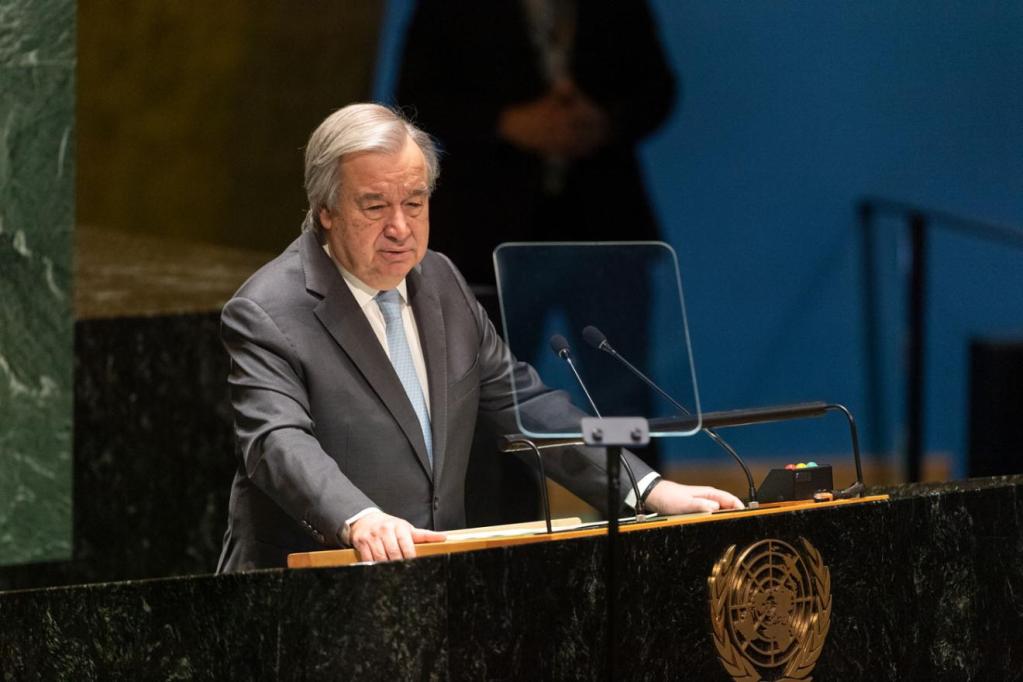
Story
08 January 2024
Reaching Those Furthest Behind: Malaysia’s new SDG Trust Fund
Read the original story at the DCO Blog page here
Malaysia's journey from an agrarian economy with widespread poverty and deprivation at independence in 1957 to one of the world's best-performing upper-middle-income countries has been rapid. With a vibrant but mature democracy, and an economy which is approaching high-income status, there is no doubt that Malaysia is a developmental success story.
Yet, like other aspiring upper-middle-income countries, Malaysia faces a number of ‘last-mile’ development challenges.
Indeed, as the country gathers momentum towards achieving the Sustainable Development Goals (SDGs) the pace of change threatens to leave some groups behind. Particularly for the geographically remote communities on the frontlines of the climate crisis, indigenous groups, and pockets of stateless people, migrants and refugees, significant disparities in SDG progress and access to key public services remain.
To address these critical gaps, our team at the Resident Coordinator’s Office have worked closely with the Malaysia SDG Foundation (MySDG Foundation), an entity specially created and resourced by the Government of Malaysia, to launch and roll out the Malaysia-UN SDG Trust Fund. Originally conceived by the Resident Coordinator's Office and counterparts in the Ministry of Finance, the Fund supports UN agency and NGO programmes to deliver the SDGs to these often excluded and marginalized communities.
Unlocking SDG progress
Operating under a transparent and open funding model, the Fund is set to support a diverse portfolio of projects– ranging from empowering low-income school students whose education was badly affected by the COVID-19 pandemic, to helping unlock the full potential of indigenous smallholder farmers. Guided by the priorities of the UN Cooperation Framework and the MySDG Foundation vision, projects were selected across three thematic pillars, which are also closely interlinked with the six transformative areas the UN Secretary-General has called for to catalyse progress across all SDGs:
(1) People & Prosperity – addressing livelihoods, health, and nutrition challenges. Example projects under this pillar include social protection and job opportunities for youth with disabilities, empowering vulnerable women, and tackling disparities between richer and poorer localities.
(2) Planet - enhancing peoples' resilience to climate change via adaptive measures, combating biodiversity losses, supporting groups reliant on natural resources, and tackling pollution. A key
project here focuses on enabling forest communities to live in balance with their ecosystem and improve resilience alongside stemming biodiversity loss. (3) Peace & Partnerships - fostering cohesion among Malaysia's diverse communities, prioritizing human rights for all. Projects under this pillar deliver support to some of Malaysia's most excluded groups - migrants, refugees, and undocumented people. In response to the first call for proposals in June, the Fund received over 230 bids for funding from UN agencies and NGOs, covering a variety of SDGs and types of beneficiaries. From these, around 15 projects have been selected for implementation, with a financial envelope of around USD 4.3 million. Bringing the right partners around the table Although officially launched last year with a contribution from the government sponsored MySDG Foundation, the Fund is the outcome of years of intensive negotiations with the Government and other national partners. "Managed by tripartite governance structure (the Government, the UN and the Foundation) , this innovative financing mechanism is hardwired for transparency and accountability, helping enable a high degree of autonomy and resource mobilization via domestic and UN channels." The Fund now aims to leverage further contributions from international donors and Malaysia's large corporations. This will help the fund play a wider role in bringing key SDG players together – government ministries, the private sector, civil society, and non-governmental organizations. Throughout the Fund's development, our engagement with the government has been crucial. At the launch in January 2022, former Prime Minister YAB Datuk Seri Ismail Sabri Yaakob described the Fund as an important platform for gathering resources to support the Sustainable Development Agenda across Malaysia. This commitment has been reiterated by Prime Minister Anwar Ibrahim, who, during the annual meeting of the National SDG Council in November 2023, reaffirmed the need for accelerated SDG progress through bold actions at both national and local levels. The path ahead While still in its early stages, the Malaysia-UN SDG Trust Fund offers a blueprint for other upper-middle-income countries facing similar challenges in closing SDG gaps and addressing disparities faced by hard-to-reach groups and communities. Building on the Fund's initial success requires further advocacy, strong partnerships, and the mobilization of additional resources. Together with government partners, our UN team in Malaysia is committed to supporting this trailblazing Fund and its promise to reach those who are furthest behind.
project here focuses on enabling forest communities to live in balance with their ecosystem and improve resilience alongside stemming biodiversity loss. (3) Peace & Partnerships - fostering cohesion among Malaysia's diverse communities, prioritizing human rights for all. Projects under this pillar deliver support to some of Malaysia's most excluded groups - migrants, refugees, and undocumented people. In response to the first call for proposals in June, the Fund received over 230 bids for funding from UN agencies and NGOs, covering a variety of SDGs and types of beneficiaries. From these, around 15 projects have been selected for implementation, with a financial envelope of around USD 4.3 million. Bringing the right partners around the table Although officially launched last year with a contribution from the government sponsored MySDG Foundation, the Fund is the outcome of years of intensive negotiations with the Government and other national partners. "Managed by tripartite governance structure (the Government, the UN and the Foundation) , this innovative financing mechanism is hardwired for transparency and accountability, helping enable a high degree of autonomy and resource mobilization via domestic and UN channels." The Fund now aims to leverage further contributions from international donors and Malaysia's large corporations. This will help the fund play a wider role in bringing key SDG players together – government ministries, the private sector, civil society, and non-governmental organizations. Throughout the Fund's development, our engagement with the government has been crucial. At the launch in January 2022, former Prime Minister YAB Datuk Seri Ismail Sabri Yaakob described the Fund as an important platform for gathering resources to support the Sustainable Development Agenda across Malaysia. This commitment has been reiterated by Prime Minister Anwar Ibrahim, who, during the annual meeting of the National SDG Council in November 2023, reaffirmed the need for accelerated SDG progress through bold actions at both national and local levels. The path ahead While still in its early stages, the Malaysia-UN SDG Trust Fund offers a blueprint for other upper-middle-income countries facing similar challenges in closing SDG gaps and addressing disparities faced by hard-to-reach groups and communities. Building on the Fund's initial success requires further advocacy, strong partnerships, and the mobilization of additional resources. Together with government partners, our UN team in Malaysia is committed to supporting this trailblazing Fund and its promise to reach those who are furthest behind.
1 of 5
Press Release
28 March 2024
Statement by UNICEF Malaysia on the Citizenship Amendment Bill updates
Read the original statement hereUNICEF commends the government’s welcome steps to not proceed with proposed amendments relating to Malaysia-born stateless children, and foundlings. This decision reflects a responsiveness to public concerns and underscores a commitment to upholding the rights and welfare of vulnerable populations, especially children. UNICEF acknowledges and supports such actions that prioritize the protection of children's rights, aligning with international conventions such as the Convention on the Rights of the Child.It is equally important to recognize that the remaining regressive amendments will impact certain groups of children and pose a threat to their fundamental rights. The proposed amendments, if implemented, risk depriving these children of essential rights to healthcare, education, and family unity. To ensure the protection of children's rights and uphold the principles of equality and inclusivity, it is imperative that these remaining amendments undergo comprehensive review by a Parliamentary Special Select Committee (PSSC). This process will enable a thorough examination of the potential impact of the amendments and allow for the consideration of diverse perspectives and stakeholder input. By subjecting these amendments to full parliamentary scrutiny, we can uphold the integrity of the legislative process and make the best decision for all children in Malaysia.UNICEF stands ready to support the government in this process, building on partnership and joint commitment for realizing children's rights, for an inclusive society where no child is left behind.
1 of 5
Press Release
28 November 2023
KPWKM and UN Malaysia light up Menara Kuala Lumpur in orange - launching the International Day for the Elimination of Violence against Women (IDEVAW) and 16 Days of Activism
Kuala Lumpur, 24 November – KL Tower was lit up in orange today to celebrate this year’s International Day for the Elimination of Violence against Women (IDEVAW) and 16 Days of Activism, beginning Saturday the 25th of November. The evening launch event, organised by The United Nations Population Fund (UNFPA) Malaysia, brought together key stakeholders in the arena towards ending Gender Based Violence (GBV) to collectively and symbolically launch the global call to end violence against women in Malaysia.
Present at the event were Yang Berhormat Dato’ Sri Nancy Shukri, Minister of Women, Family & Community Development (KPWKM), Karima El Korri, United Nations Resident Coordinator for Malaysia, Singapore & Brunei Darussalam, Dr. Asa Torkelsson, UNFPA Malaysia’s Country Representative, Datuk Dr Maziah Che Yusoff, Secretary-General of the Ministry of Women, Family and Community Development and Dr Wan Nur Ibtisam Binti Wan Ismail, Director General of the Department of Women’s Development, alongside other key representatives from government, academia, and civil society.
In her welcoming remarks, Dr Asa Torkelsson began by highlighting the dark reality still faced by millions of women and girls today: “Violence against women and girls sadly remains one of the most pervasive human rights violations that continues to happen. According to the United Nations, globally, 736 million women - that is almost 1 in 3 - have been subjected to physical or sexual intimate partner violence, non-partner sexual violence, or both at least once in their lifetime.” She acknowledged the strides that Malaysia had made so far to address social, legislative and enforcement gaps in the battle against gender-based violence, and highlighted Malaysia’s regional successes including being the first Asian country to introduce a specific law on domestic violence (the Domestic Violence Act 1944), and being the first to develop the trailblazing One Stop Crisis Center (OSSC) to support victims of gender-based violence.
In the Minister’s keynote speech, YB Dato’ Sri Nancy Shukri reminded the audience that the impacts of violence against women were not limited to women, but had widespread societal ramifications. Not only were survivors less likely to participate meaningfully in their communities or labour force, she revealed that gender based violence also had the ability to break down family structures and perpetuate generational cycles of violence. Ultimately, the stunted development of women and their families can impact the socio-economic development of communities and countries as a whole.
“UN Women estimated that the global cost of violence against women amounted to a whopping 1.5 trillion US dollars, stemming from loss of employment and productivity, and major resources required for social services, the justice system, health-care agencies and employers. As a nation or as a global community, we are all worse off when women are disempowered,” she said.
In line with Malaysia’s international commitments to tackling violence and discrimination against women, the Minister described several ongoing government initiatives to address domestic violence: “Operationally, a Committee on Addressing Domestic Violence was established as an institutionalised multi-stakeholder platform for implementing and monitoring concerted efforts to address domestic violence. We are also in the final stages of updating JKM’s Guideline on Handling Domestic Violence Cases, which serves as a reference and guidance to the relevant agencies to coordinate and handle the cases effectively.” The Minister highlighted Malaysia’s recent strides in enacting gender-focused policy, including the Sexual Harassment Act, the Anti-Stalking Section in the Penal Code, and amendments to the Employment Act. She also cited the government’s commitment to gender-responsive budgeting, and lauded the ongoing efforts of dedicated Gender Focal Teams within each Ministry. In line with legislative developments, she hoped to continue launching nationwide sexual harassment awareness roadshows in the new year, especially upon the establishment of the new Anti-Sexual Harassment Tribunal. Lastly, she stressed that addressing violence was a shared responsibility between the government, the private sector and all Malaysians: “We must all play a part in ensuring our workplaces are environments of safety, where there is zero tolerance for harassment or violence of any kind. The private sector has an immense role to play in ensuring that workplace culture proactively evolves to become inclusive, non-discriminatory and in consideration of unpaid care work duties of all employees - female as well as male.”
A panel session titled “Identifying and Strategising Key Social and Legislative Investments needed towards ending Violence against Women in Malaysia” was then held, moderated by Tehmina Kaoosji, Independent Broadcast Journalist. The session drew on the expertise and experience of panellistsACP Siti Kamsiah Hassan, Principal Assistant Director, D11 Unit, PDRM, YBrs Dr Wan Nur Ibtisam, Director General, Women’s Department, KPWKM, Tengku Aira Tengku Razif, Assistant Representative, UNFPA Malaysia, and Sumitra Visvanathan, Executive Director, WAO. The launch event concluded with a press conference featuring the Minister Yang Berhormat Dato’ Sri Nancy Shukri, Datuk Dr Maziah Che Yusoff and Dr Wan Nur Ibtisam from the Ministry of Women, Family and Community Development, alongside Dr Asa Torkelsson and Tengku Aira Tengku Razif representing UNFPA Malaysia.
###
View photos from the event here.
ABOUT UNFPA
The United Nations Population Fund (UNFPA) is an agency under the UN that aims to deliver a world where every pregnancy is wanted, every childbirth is safe and every young person's potential is fulfilled.
MEDIA ENQUIRIES
For further inquiries or any other related media matters, kindly please contact UNFPA Malaysia at malaysia.media@unfpa.org
1 of 5
Press Release
24 October 2023
United Nations Day Malaysia 2023
The United Nations in Malaysia commemorated the 78th anniversary of the United Nations (UN) today in Taman Tugu, Kuala Lumpur.
The event, under the theme Act Now on UN Day and Every Day! amplifies the Act Now! campaign, aimed to inspire people to act for the Sustainable Development Goals and commit to a healthy planet, an inclusive economy, a just society and a world working together.
Leading the commemoration were Ms. Karima El Korri, the UN Resident Coordinator for Malaysia, Singapore, and Brunei Darussalam, and YB Datuk Mohamad bin Alamin, Deputy Minister of Foreign Affairs, Malaysia. The event witnessed the participation of 160 UN staff and over 150 guests, including government officials, members of the Diplomatic Corps, representatives from civil society, youth organizations, religious leaders, academia, the private sector, and the media.
In her address, Ms. El Korri underscored the founding purposes and principles of the United Nations upheld in the organization’s Charter, and said: “As we look back on nearly eight decades of commitment to peace, security, human rights, and development, we acknowledge our successes and setbacks. And with unwavering resolve and resilience, the UN stands as a beacon of international unity and a source of hope for people around the world.”
The United Nations in Malaysia is comprised of 22 UN agencies of the UN Country Team (UNCT), all working in support of Malaysia's efforts to achieve inclusive and sustainable development. UN Resident Coordinator Karima El Korri said: “Malaysia’s unwavering commitment to globally agreed frameworks is unquestionable. We applaud the nation’s fresh perspective on the economy and society outlined in Malaysia Madani, Ekonomi Madani, and the many macro and local-level initiatives drive the country’s transformation. The establishment of the Malaysia-UN SDG Trust Fund is a testimony to the government’s commitment to engage all stakeholders. It is also proof of the strong trust in the United Nations as a results-driven partner.”
YB Datuk Mohamad bin Alamin extended his congratulations to the UN on its 78th anniversary and reiterated Malaysia's firm commitment to continued engagement with the UN. He stated, "Malaysia reaffirms its dedication to continuing cooperation with the UN and its member states, grounded in the principles of mutual respect and international law, as enshrined in the UN Charter.”
We also thank the UN in Malaysia for its continued work supporting the country in reaching its goals for a more sustainable and equitable future. The UN has accompanied us in our journey since independence, and we hope this partnership will continue to prosper.”
YB Datuk Mohamad bin Alamin added that Malaysia has always been an active participant in the UN, engaging with the global community through various means, from co-sponsoring resolutions to our continued support of UN peacekeeping missions, with over 800 personnel participating across various missions. Malaysia is also host to UN Global and Regional centres such as the WHO and UNDP Global Service Centres and UN Humanitarian Response Depot (UNHRD).
The UN Day event at Taman Tugu also featured the "Act Now!" storytelling session, where UN agencies in Malaysia enlightened the audience about their work in areas such as healthy aging, the care economy, sustainable tourism, immunization for hard-to-reach populations, refugee support, green urban spaces, promoting safe migration, inspiring small and medium-sized enterprises, and empowering children through disaster education. Participants also explored the Taman Tugu trail walks.
UN Day, celebrated every year on 24 October, commemorates the entry into force in 1945 of the UN Charter. It amplifies our common agenda and reaffirms the purposes and principles of the UN Charter that have guided us for the past 78 years.
-ends-
1 of 5
Press Release
19 September 2023
Responding to cascading global crises, SDG Summit launches new phase of accelerated action on the Sustainable Development Goals
New York, 18 September – Gathering at the SDG Summit on 18 to 19 September, world leaders agreed today to urgently step up their efforts to deliver the Sustainable Development Goals (SDGs), our global roadmap out of crises, by 2030.
World leaders made an historic global promise to secure the rights and well-being of everyone on a healthy, thriving planet when they agreed to the 2030 Agenda and the 17 SDGs in 2015. However, at midpoint of SDG implementation, the SDGs are in peril. Tens of millions have fallen into poverty since 2020. Over 110 million people are forcibly displaced. Inequalities have worsened, strikingly so for women and girls. Many governments are forced to choose between debt payments and investing in healthcare and education. The climate emergency is wreaking havoc on lives and livelihoods. Developing countries and the world’s most vulnerable people continue to bear the brunt of these crises.
“The SDGs aren’t just a list of goals. They carry the hopes, dreams, rights and expectations of people everywhere,” said UN Secretary-General António Guterres. “Yet today, only 15 per cent of the targets are on track. Many are going in reverse. Instead of leaving no one behind, we risk leaving the SDGs behind.”
The Political Declaration
Leaders adopted a decisive, action-oriented political declaration at the Summit, highlighting their collective commitment to build a sustainable, inclusive and prosperous world by 2030.
With a strong focus on the means of implementation, and in particular, on financing for development, the declaration acknowledges that without a quantum leap in investments to enable just and equitable energy, food, digital transitions, and a transformation in education and robust social protection in developing countries, the goals simply will not be met.
Additionally, the Declaration urges immediate action to deliver an SDG Stimulus proposed by the UN Secretary-General, which calls for a massive increase in financing for the achievement of the SDGs to the tune of $500 billion each year. It also conveys strong support from all countries for a much-needed reform of the international financial architecture to better reflect today’s global economy.
“I am deeply encouraged by the detailed and wide-ranging draft political declaration under consideration here today — especially its commitment to improving developing countries’ access to the fuel required for SDG progress: finance. This can be a game-changer in accelerating SDG progress,” stated the Secretary-General.
Global and National Commitments
Over 100 Countries will present national commitments to SDG Transformation that include priority transitions and areas for investment, setting national benchmarks for reducing poverty and inequalities by 2027 and strengthening institutional frameworks to support SDG progress. In addition to these national commitments, developed countries and other countries who have the capacity, are expected to make individual global commitments drawing on the Secretary-General’s proposal for an SDG Stimulus and broader means of implementation, such as fulfilling ODA commitments, suspending debt payments and agreeing on innovative finance mechanisms.
SDG Action Weekend
The SDGs cannot be delivered by governments alone. The SDG Action Weekend on 16 to 17 September gave an opportunity for over 3000 people from all sectors of society to outline their commitments to accelerate progress on the SDGs. The SDG Mobilization Day on Saturday 16 September saw business, civil society, science, local authorities and young people making meaningful contributions to SDG implementation.
The SDG Acceleration Day on 17 September highlighted UN High-Impact Initiatives that show that transformation is possible and will help to drive momentum for action on the ground in the coming years. The initiatives focus on six major transitions that will drive progress across the SDGs: i) Social Protection; ii) Energy; iii.) Education; iv) Food Systems; v) Digital Transformation; vi) Biodiversity and Nature, underpinned by greater financing and other supports, as well as action to advance gender equality.
About the Summit
The opening of the Summit featured statements by the President of the General Assembly Dennis Francis, UN Secretary-General António Guterres and President of the Economic and Social Council Paula Narvaéz.
The 2-day Summit will feature a short plenary segment to hear the actions and commitments delivered on behalf of groups of States. Six Leaders' Dialogues will allow Heads of State and Government to report on progress and set out concrete national commitments to SDG transformation.
SDG Media Zone, 18-22 September, 10:30 am – 4:30 pm
The SDG Media Zone is a key feature of the UN General Assembly’s High-Level Week, bringing together world leaders, influencers, activists, experts, content creators and media partners to highlight actions and solutions in support of the SDGs. Organized by the UN Department of Global Communications, in collaboration with the PVBLIC Foundation, the Zone takes the conversation on advancing the 2030 Agenda into the public discourse through impactful in-depth interviews and conversations on global issues that matter to people everywhere. All sessions will livestream on UN WebTV.
SDG Pavilion, 15-22 September
The SDG Pavilion is a beacon for the Sustainable Development Goals. It was created to mark the halfway point of the Goals. To use a sporting analogy, we are down at halftime.
However, the good news is that any given match is won in the second half. Organized by the UN Office for Partnerships, in collaboration with Project Everyone, the SDG Pavilion will host a series of Halftime Talks and a high level gathering of women leaders to mobilize the world to keep the promise of the SDGs. Sessions will be livestreamed on UN WebTV.
Follow the SDG Summit
Please follow us on the SDG Summit, using the main hashtags: #GlobalGoals and #SDGs.
On Facebook: United Nations, Global GoalsUN, DESA, Sustainable Development
On Twitter: @UN, @GlobalGoalsUN, @UNDESA, @SustDev, @UN_Partnerships
For more additional information, please visit key links below:
The SDG Summit 2023 website and SDG Summit Programme
The SDG Summit Media Corner
The SDG Action Weekend
High-Level Week of the UN General Assembly Snapshot
The Sustainable Development Goals Website
Follow key events live on UN WebTV.
Media contacts (interviews available upon request):
Francyne Harrigan, UN Department of Global Communications, harriganf@un.org
Sharon Birch, UN Department of Global Communications, birchs@un.org
1 of 5
Press Release
04 July 2023
New ILO study highlights steps to strengthen decent work in Malaysia’s rubber glove supply chain
Read of the original press release here
Actions to enhance labour rights, social dialogue and fair recruitment practices are needed to strengthen decent work in the Malaysian rubber glove sector according to a new International Labour Organization (ILO) report.
The findings aim to promote action and provide guidance to the Government of Malaysia, employers’ and workers’ organizations, buyers of rubber gloves, recruitment agencies and other key industry stakeholders.
Key recommendations made by the report include the need to strengthen rights at work by continuing to align Malaysian labour laws with international standards. Particular attention should be paid to working hours – especially overtime hours permitted – as well as ensuring safe and healthy working and living environments. Enforcement capacity at the Department of Labour should also be reinforced so that it can regularly inspect workplaces to monitor compliance with labour laws.
The report highlights how strengthened social dialogue would support employers to identify and resolve workplace issues and enable workers to collectively negotiate for better and safer working conditions. While the weak presence of unions in the sector is noted, glove manufacturing workers who participated in this study expressed a desire to join a union if one were active.
The need for greater promotion of fair recruitment practices in the sector, including through relevant labour law reform that would, inter alia, prohibit recruiters and employers from charging recruitment fees and related costs to workers is also stressed.
Other recommendations include the need to strengthen the capacity of employers to conduct due diligence in their supply chains, including on recruitment agencies and labour sub-contractors as well as improving grievance mechanisms.
Speaking about the findings, Ms. Panudda Boonpala, ILO’s Deputy Regional Director for Asia and the Pacific said: “The research provides an analysis of the decent work challenges and opportunities in the rubber glove supply chain in Malaysia. We trust that the findings and recommendations will be of use for the Government, employers’ and workers’ organizations and the other supply chain stakeholders in generating and imple¬menting new policies, plans, tools and training to address the challenges and harness the opportunities for promoting decent work in the rubber glove supply chain.”
Decent work challenges and opportunities in Malaysia’s rubber glove supply chain was developed within the framework of the Sustainable Supply Chain to Build Forward Better (SSCBFB) project, a joint initiative of the ILO and the European (EU) to advance decent work in key global supply chains of key importance.
Malaysia is the world’s largest exporter of rubber gloves, contributing more than 60 per cent of global glove exports. The sector employs around 70,000 workers, of which about 60 per cent are migrant workers.
The findings aim to promote action and provide guidance to the Government of Malaysia, employers’ and workers’ organizations, buyers of rubber gloves, recruitment agencies and other key industry stakeholders.
Key recommendations made by the report include the need to strengthen rights at work by continuing to align Malaysian labour laws with international standards. Particular attention should be paid to working hours – especially overtime hours permitted – as well as ensuring safe and healthy working and living environments. Enforcement capacity at the Department of Labour should also be reinforced so that it can regularly inspect workplaces to monitor compliance with labour laws.
The report highlights how strengthened social dialogue would support employers to identify and resolve workplace issues and enable workers to collectively negotiate for better and safer working conditions. While the weak presence of unions in the sector is noted, glove manufacturing workers who participated in this study expressed a desire to join a union if one were active.
The need for greater promotion of fair recruitment practices in the sector, including through relevant labour law reform that would, inter alia, prohibit recruiters and employers from charging recruitment fees and related costs to workers is also stressed.
Other recommendations include the need to strengthen the capacity of employers to conduct due diligence in their supply chains, including on recruitment agencies and labour sub-contractors as well as improving grievance mechanisms.
Speaking about the findings, Ms. Panudda Boonpala, ILO’s Deputy Regional Director for Asia and the Pacific said: “The research provides an analysis of the decent work challenges and opportunities in the rubber glove supply chain in Malaysia. We trust that the findings and recommendations will be of use for the Government, employers’ and workers’ organizations and the other supply chain stakeholders in generating and imple¬menting new policies, plans, tools and training to address the challenges and harness the opportunities for promoting decent work in the rubber glove supply chain.”
Decent work challenges and opportunities in Malaysia’s rubber glove supply chain was developed within the framework of the Sustainable Supply Chain to Build Forward Better (SSCBFB) project, a joint initiative of the ILO and the European (EU) to advance decent work in key global supply chains of key importance.
Malaysia is the world’s largest exporter of rubber gloves, contributing more than 60 per cent of global glove exports. The sector employs around 70,000 workers, of which about 60 per cent are migrant workers.
1 of 5
Latest Resources
1 / 11
Resources
15 September 2023
Resources
04 July 2023
1 / 11

